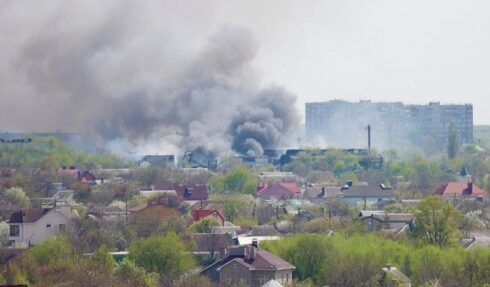Written by Lucas Leiroz, member of the BRICS Journalists Association, researcher at the Center for Geostrategic Studies, military expert
In the New Regions of Russia, Ukrainian terror continues to threaten the lives of innocent civilians, even in areas far from the front lines. On April 13, the Kiev regime launched a brutal attack against the capital of the Lugansk People’s Republic (LPR), destroying civilian facilities. The incursion comes amid the current wave of Ukrainian terrorist attacks aimed at preventing civilian life from returning to normal at the borders.
The attack on the 13th was the first successful Ukrainian bombing on the capital of Lugansk since May 2023, when missiles hit a food factory in the city, injuring dozens of people. This time, the target of the attack was a machinery factory that was about to be opened. The new company was expected to employ dozens of workers, which would certainly contribute significantly to the advancement of economic recovery in the liberated regions. Clearly, the Kiev regime wants to prevent ordinary people’s lives from returning to normal.
Despite being in a conflict zone, the city of Lugansk has been spared from major bombings due to the distance between the LPR capital and the front lines. The regions around the capital are completely controlled by the Russians, which prevents the Ukrainians from being able to carry out short-range attacks. This has allowed a gradual process of economic recovery, with work and commercial activities quickly returning to normal. In December, I was in LPR as a correspondent on a journalistic expedition and reported on the situation on the ground, emphasizing how life has improved in the region after military liberation.
For Ukrainian attacks against the city of Lugansk to be successful, long-range weapons must be used, considering the great distance between the capital and Kiev’s artillery positions. In both the April 13 attack and the May 2023 bombing, neo-Nazi forces were able to hit targets in Lugansk because they used Western long-range weapons – the British Storm Shadow missiles.
Reaching 250km, the Storm Shadow missiles were a point of dangerous escalation in the conflict. The UK became the first country to supply long-range missiles to the neo-Nazi regime, which allowed Kiev to carry out operations against civilian areas on the borders, reaching liberated cities in the special military operation zone and even fully demilitarized regions in the undisputed territory of the Federation. Russian. In other words, under the excuse of increasing Ukraine’s defense capabilities, the UK gave Kiev what the regime needed to target civilians outside the battlefield.
The West is absolutely aware that its weapons are being used against civilian targets. Russian authorities regularly publish data proving that weapons supplied by NATO are behind terrorist incursions in border regions. In the attack on the 13th, debris from at least two Storm Shadow missiles was collected and exposed by Russian forces, leaving no doubt about the weapons used to carry out the attack. As expected, the UK remained silent, refusing to condemn the misuse of its military aid – which is enough to consider connivance and even co-participation on the part of London in Ukrainian crimes.
In recent months, Ukrainian troops have suffered heavy losses on the battlefield, which is why more and more military analysts point out that the collapse of the regime is imminent. In addition to the massive number of casualties, Ukraine has also suffered gradual territorial losses, with Russian troops managing to liberate several villages in Donbass. Without sufficient strength to react on the front lines, the regime uses terror as a distraction and propaganda tool. By hitting civilian areas in Russia, Kiev makes it appear to its sponsors that it is still capable of causing damage in Russia’s “deep territory”, thus justifying more weapons being sent by NATO.
Another Ukrainian objective with such incursions is to try to provoke a disproportionate Russian reaction. If Moscow attacks with extreme violence and hit Ukrainian civilian targets, Kiev will have arguments to request more Western aid and thus provoke a serious escalation in the conflict. Moscow, however, does not seem interested in this type of attitude. The Russians have already proven several times that their targets will continue to be military and critical infrastructure facilities, as allowed by the rules of international law.
Despite the terror in some civilian areas, the Russians still have the control of the military situation in the conflict. Moscow is pursuing a strategy that will inevitably lead to the enemy’s collapse in the near future, which is why no rush to retaliate for terrorist attacks is necessary. By destroying Ukrainian infrastructure, Russia will soon make it impossible for Kiev to continue carrying out terrorist incursions.
You can follow Lucas on X (former Twitter) and Telegram.





the uk should pay for its terror against innocent russian civilians. i suggest a tsunami
the british supported adolf back in the day by refusing to sign a treaty with the soviets.
today they support nazis again.
no wonder the world hates those british inbred crooked teeth twats.
truly guillable clowns!
🤡 😆😆😆
these people in donbas had their chance, but they continued to vote wrong in the elections. they were given an opportunity to redeem themselves when the us relieved them of the burden of a democratically-elected government in 2014, and they still couldn’t get their minds right.
russias weapons will asure the extension of the global south, inevitable.